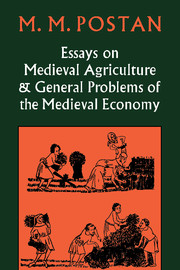Book contents
- Frontmatter
- Preface
- Acknowledgements
- Contents
- I GENERAL
- 1 The economical foundations of medieval economy
- 2 The rise of a money economy
- 3 The fifteenth century
- 4 Some social consequences of the Hundred Years War
- 5 The costs of the Hundred Years War
- 6 Why was science backward in the Middle Ages?
- II AGRARIAN
- Index
- Plate section
4 - Some social consequences of the Hundred Years War
Published online by Cambridge University Press: 05 November 2011
- Frontmatter
- Preface
- Acknowledgements
- Contents
- I GENERAL
- 1 The economical foundations of medieval economy
- 2 The rise of a money economy
- 3 The fifteenth century
- 4 Some social consequences of the Hundred Years War
- 5 The costs of the Hundred Years War
- 6 Why was science backward in the Middle Ages?
- II AGRARIAN
- Index
- Plate section
Summary
The Hundred Years War shares with the Reformation and the French Revolution the reputation of being a ‘turning point’ or a ‘watershed’. It is commonly referred to as the culminating episode of the Middle Ages, marking the final failure of the feudal armies. Having destroyed the feudal order, the War also reared its successor. It has been generally accepted, even by Bernard Shaw, that out of the clash between the French and the English kings the national state and the nationalist conception of international policy emerged triumphant.
It is not our object here to quarrel with this generalization. As long as it is general enough and confined to notions as vague as those of the feudal order and the national state, it is both difficult and unnecessary to disprove. There is no denying that the hundred and fifty years which separated the beginning of the War from the final pacification of Western Europe under Louis XI were marked by many signs of popular nationalism. During the same period in one country at least, namely France, national monarchy and national unity were greatly strengthened. On the other hand, in countries other than France or Britain, national sentiment was no more in evidence in the fourteenth and fifteenth centuries than it had been in earlier times. Where it operated, in the Hussite War and at Tannenberg, it owed little or nothing to the issues which roused similar feelings at Grécy and Orléans.
- Type
- Chapter
- Information
- Publisher: Cambridge University PressPrint publication year: 1973



